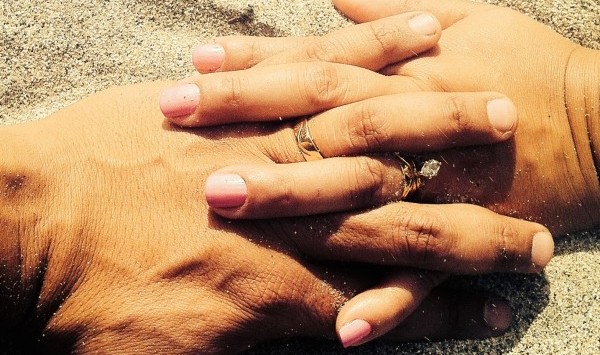- Do you really think that black is beautiful? Or is that just something you say because it sounds cool?
- Yes, I really think that black is beautiful. I know that’s SO, so, so hard for you to believe, Buzzfeed. It’s hard as hell for you to believe I’m telling the truth. You really, really have to work hard to trust me on this. But it’s true.
- Wait a second — if you think black is beautiful, why the hell are you asking the question? Are you saying black is ugly? I can’t.
- Why do some black people say that you’re pretty for a dark-skinned girl? Every time that is said to me, it still makes me feel like the ugliest little black thing.
- Jesus Christ. This is, like, the same exact question as the last three. How hard is it for you to believe that it’s, um, actually possible for black people to think black people look nice? I can’t….
- Let’s see…you think black people think white skin look better than people with dark skin, that black people can’t really think their skin is beautiful, and then you complain about feeling like “the ugliest little black thing”? I don’t know what to tell you. I could say your skin is beautiful, but you already said that you don’t trust those words. What black person is this determined to be trapped in a box of “I’m ugly”? I can’t…
- I’m done with this — see previous answers.
- Why do some black men only date white women?
- The stereotype is less true than advertised — especially the part of the myth where black men try to earn money just to marry a white woman. Black men prefer black women significantly, especially considering the fact that there are much fewer black women than white women:
Eighty-eight percent of all black men who are married are married to black women. When we use the census to compare household economic status between black and interracial couples, we find that 8 percent of black males who are living at or near poverty have a white wife, and 9 percent of black males who are middle class or better have a white wife. Among married black men with a personal income of more than $100,000, 12 percent have a white wife, 83 percent have a black wife, and 5 percent have a wife who is neither black nor white. Six percent of married black men who are high school dropouts have a white wife and 92 percent have black wives. Among black men with college degrees, 10 percent have a white wife and 85 percent have black wives. Among black male professional athletes, 72.8% are married to black women, 22.2% are married to white women, and 5% are married to women who are neither black nor white.
- This question is partially a product of the “black brute” stereotype, when, in the late nineteenth century, white people starting saying that the recently freed slaves would chase white women — seeking to rape them. They perpetuated the stereotype to keep black men from getting jobs or becoming prominent members of society. And that stereotype got baked deep into society. Because people look to fulfill those stereotypes, they notice black men having relationships with white women more than with black women (although, statistically, if race wasn’t a factor at all you’d expect more black men to date predominantly white women, as there are a hell of a lot more of them).
- Given the first two bullet points — sometimes this happens because of resentment over racism. In some cases, it’s probably just personal preference. In others, black men are told they can’t have white women — they have been told that for years — so they want the things that they are told by culture that they can’t have; something you can’t have can look more desirable.
- The stereotype is less true than advertised — especially the part of the myth where black men try to earn money just to marry a white woman. Black men prefer black women significantly, especially considering the fact that there are much fewer black women than white women:
- Why is it OK for a black man to date white women, but not OK for a black woman to date outside her race?
- It goes both ways. People give tons of side-eye to a black man who dates white women and to black women who date white men. It’s just that black men dating white women plays into a well-established stereotype, so people treat that as more expected than a black woman dating a white man. It seems less that one is less OK than the other (as both seem taboo), and more that one is more expected than the other.
- Why do you protest “black lives matter,” and then tear each other down in the next breath?
- If you’re referring to the riots — because people were angry that their lives didn’t matter, they set fire to businesses. Not homes. Businesses — many of which were actually franchises owned by white corporations. And those that weren’t — the people were struggling, often, to pay rent and warrants (in some cases, as in Ferguson, there were more warrants out than there were people living in the area). So they were angry at not getting jobs. And say what you want about the riots, but they got national attention and forced change. I’m not saying they were right. But they were done because people wanted urgent change. In addition, many black individuals blocked local stores so they wouldn’t get looted.
- Black Lives Matter is about the issue of the police acting badly towards black people. The police should be held to a higher standard than civilians, it seems.
- If you’re talking about political disagreements — it’s because we think black lives matter so much that we are passionate when it comes to differences in how to handle black lives in culture.
- And, um…even on top of that, why are you saying that black people are just into tearing each other down? Do you know nothing about black history? We’ve had disagreements, but we got to where we are by working hard, together.
- Why do we say that we don’t want to be seen as a monolith, but then try to take people’s black cards away for not liking something that’s “supposedly black”?
- I’d answer this, but I don’t remember a black person really doing this to me, especially seriously. White people, on the other hand, do this a lot. A whole lot. So it’s a question I really think they should answer.
- I’m not saying this doesn’t happen. But when it does happen, it tends to happen, honestly, because the way one of us is seen tends to be automatically generalized to the whole race. This may make us more self-conscious about ourselves than white people may be about themselves — if a black person does something bad, it can make all of us look bad. In addition, black people who do not conform to stereotypes frequently get sidelined in society, so there may be more pressure to encourage more conformity due to the fear that one’s own reputation may be challenged. It’s complicated. That said, I do tend to think this question, in my experience, is primarily one asked by white individuals than by black ones.
- Why are you so quick to support a non-black-owned business, but then hesitate when it’s a black-owned business.
- I don’t usually look at the race of a business owner before I take their business, so I can’t tell you. I do know that some black people intentionally go to black-owned businesses, and in trying to, for example, eat dinner with them, I can tell you that doing so takes a ton of research. So I’m a bit lost with this question.
- Is there a cutoff time for this whole homophobia thing in the black community? Because I’m really look forward to that.
- A bit of research and some personal experience shows that this may be a somewhat valid criticism — BUT WAIT. Wait. Sit back down. Because it’s more complicated than just that.
- Black men have had to deal with the “black brute” stereotype — basically, they were stereotyped as having exaggerated masculine features, of being stronger, faster, and more passionate than white men — while also less refined. More prone to violence and more virile. After we failed to defeat the stereotype, we embraced it in order to force change in Civil Rights — scholars have argued that leaders such as W.E.B. DuBois, Malcolm X, and Martin Luther King, Jr. are the result of these efforts. And it worked, because of a stereotype that white people made up. Black men were intimidating enough, as a stereotype, to force change.One response was to attack these masculine qualities and thus take away the power of the stereotype and the fear the stereotype created in white people (althought the black brute caricature is still current and often perpetuates racism). The way this was done was by associating black men with a more disenfranchised class that was stereotyped as weaker — women. And so there were movie portrayals of “tough guy” men as women. Fresh off the Civil Rights movement, some black people strongly resisted. Now, that’s not right. It’s not right that women were seen as second class citizens, or that blacks were, or that black masculinity became a warped “black brute” stereotype — it’s all an ugly mess. But the homophobia is, arguably, a result of pitting and rearranging these stereotypes in order to get to the ultimate goal — disenfranchising black people. This is changing, however — but it should be seen that the fight against homophobia is intricately connected to the fight to eradicate the racist culture that has been a reason why harmful stereotypes of masculinity were used to protect black individuals in the first place. The problem needs solving, but it’s complicated.
- Why is growing up without a father so common in our race?
- Ugh.
- OK, first, the problem is more exaggerated than many would have you believe. In spite of all the obstacles most black fathers experience, 67% percent of black fathers live with their kids (compared to 59% of white fathers — pretty close considering what’s under the next bullet point) Most black fathers live with their children, and those that do are more engaged with their children than white fathers. Even black fathers who don’t live with their kids tend to spend significantly more time with their kids than white fathers who don’t live with their kids.
- We have the highest incarceration rate in the world in the United States, largely do to the fact that 30-40% of men incarcerated are black men who are victims of a racist justice system that gives them longer prison sentences — there are more black men in jail than white men, although there are much fewer black men in the population. Black men are also less likely to get jobs than white men, they are less likely to get paid well on the job than white men, they usually grow up in poorer neighborhoods due to aftereffects of segregation and housing discrimination, and they face racism at almost every turn. Of course fewer black fathers would be home to take care of their kids, with all they are going up against in this culture — they simply can’t be there. And yet, the stats show that they genuinely try to be.
- Get out of here with that racist BS.
- Why don’t we like to confront our mental health issues? Therapy is such a wonderful and magical place.
- Wonderful, magical place? Um…according to an article in Psychology Today, racism is rampant among therapists. Honestly, I shouldn’t need an article to make this point. It’s kinda something that seems self-evident. We are already dealing with a zillion stereotypes before we even walk in the door. Maybe if white people were less racist we would trust them with our minds. Until then…
- Also…why is this calling out mental health issues? Like, as if black people obviously have them. I know we do, but everyone does…calling out black people specifically as having mental health issues seems to perpetuate the problem.
- Why is there a checklist for being black?
- This is really a question for white people, given their construction of the stereotypes we are forced to deal with.
- The way one black person is seen is usually automatically generalized to the whole race by white people, especially if it interacts with stereotypes in prominent ways. This may make us more self-conscious about the “checklist” of stereotypes white people have created — because if a black person does something bad, it can make all of us look bad. In addition, black people who do not conform to stereotypes frequently get sidelined in society, so there may be more pressure to encourage more conformity due to the fear that one’s own reputation may be challenged. It’s complicated. That said, I do tend to think this checklist is more prominent in the minds of white individuals than black ones.
















